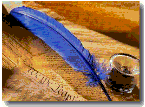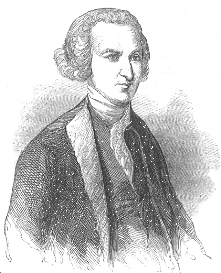
The Declaration of Independence
When in the course of human events . . .
John Dickinson
Representing Pennsylvania to the Continental Congress
Born: November 13, 1732
Birthplace: Talbot County, Maryland
Education: Private tutors, Temple of London, England (Lawyer)
Work: Elected to the Pennsylvania Assembly, 1764; Member of Stamp Act Congress, 1765; Member of the Continental Congress, 1774-1776, '79; Member of Delaware Assembly, 1780; Governor of Pennsylvania, 1782-1785; Member of Constitutional Convention, 1787; Member of Delaware Constitutional Convention, 1792.
Died: February 14, 1808

Portrait of John Dickinson
John Dickinson lived one of the most extraordinary political lives of all of the founding fathers. It is perhaps only because of his steadfast opposition to American independence that he is not celebrated with the likes of Washington, Jefferson, and Franklin.
He was born to a moderately wealthy family in Maryland. His father was first judge to the Court of Pleas in Delaware. He studied law at the Temple in London, the most prestigious education that a young man could hope for. Dickinson joined politics as a member of the Pennsylvania assembly in 1764, proceeded with the Stamp Act Congress in 1765 where he drafted the Resolutions of the Stamp Act Congress. It was also during this he wrote an important series of essays, Letters of a Pennsylvania Farmer, regarding the nonimportation and nonexportation agreements against Gr. Britain. These essays were published in London in 1768 by Benjamin Franklin, and later translated to French and published in Paris. In 1774 he attended the first Continental Congress and wrote an Address to the Inhabitants of the Province of Quebec. There also, in 1775, and in combination with Jefferson, he wrote a Declaration of the Causes and Necessity of Taking Up Arms. Dickinson was opposed to a separation from Gr. Britain and worked very hard to temper the language and action of the Congress, in an effort to maintain the possibility of reconciliation. It was for this reason that he abstained from voting on and signing the Declaration of Independence. In what may have been a rather cruel joke, Thomas M'Kean (a signer of the Declaration), then president of Delaware, appointed Dickinson a Brigadier-General in the Continental Army. His Military career is said to have been brief.
Dickinson was elected again to the Continental Congress in 1779, then to the Delaware Assembly in 1780. He was elected Governor of Pennsylvania in 1782 and served there until October, 1785. He joined the Constitutional Convention in Philadelphia in 1787 and afterward joined the chorus of writers promoting the new constitution, in a series of nine essays, using the pen name of Fabius. In 1792 he assisted in forming a new constitution for Delaware. He wrote another series of articles in 1797. He shortly thereafter retired from public life to his home at Wilmington, where he died on the 14th of February 1808. Dickinson College, at Carlisle Pennsylvania, is monument to his memory.
Start page | The Document | Signers | Related Information | Jefferson's Account | Declaration House | Declaration Timeline | Rev. War Timeline | More Resources |





